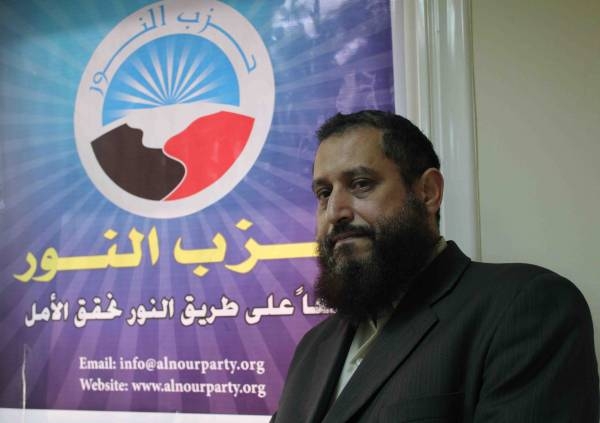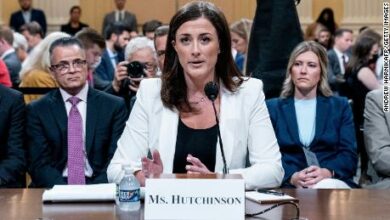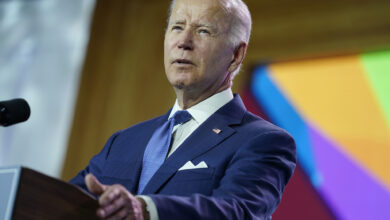
A visit to the Maadi headquarters of the Salafi Nour Party instantly contradicts some stereotypes of the ultraconservative Islamic movement. At the reception area, two bearded young men dressed in modern clothes show no hostility toward a non-veiled female journalist. Unlike typical Salafis, they seem quite comfortable conducting a conversation while making eye contact with a woman.
Beyond the reception area, Emad Abdel Ghafour, the party’s chairman, sits in his office waiting for yet another reporter. His party’s unexpected gains in the ongoing parliamentary poll have prompted local and international media to learn more about the vision of Egypt’s rising ultraconservative politicians.
The soft-spoken 51-year-old, who quit his job as a surgeon earlier this year to enter politics, is tired of rebutting claims that his party seeks to Islamize the state and issue legislation that would infringe upon personal liberties for the sake of conforming to Islamic Sharia.
“I do not know how to send more assurances,” complains Abdel Ghafour, whose brown beard reaches past the collar of his pistachio-green shirt.
“We [Salafis] suffered a lot of discrimination and our freedom was restricted before the revolution. We think that whoever has suffered discrimination and restrictions on his own freedom cannot do that to others,” Abdel Ghafour tells Egypt Independent.
The Nour Party’s victory in the first round of the parliamentary poll has taken the nation by surprise. In last week’s vote, the six-month-old party secured almost 25 percent of the votes in nine governorates, coming in second after the Freedom and Justice Party, the Muslim Brotherhood’s political wing, which won almost 40 percent.
The sudden ascent of Salafis has renewed fears that Egypt is on the precipice of becoming a religious state in the model of Iran or Saudi Arabia. Abdel Ghafour dismisses these concerns, saying his party is willing to accept the parameters spelled out in the old constitution governing the role of religion in politics.
“If Article 2 is maintained as is without any addition or amendment, we will accept it as a way to reach an agreement [with other political forces],” says Abdel Ghafour, referring to the old provision stipulating that Islam is Egypt’s official religion, Arabic its official language, and that the principles of Islamic Sharia are the primary source of legislation.
This last clause has been in place since 1980, but it never translated into the Islamization of Egypt’s laws. The Egyptian legal system remains inspired by French law with a few exceptions, such as inheritance laws, which are based on Islamic Sharia.
After Hosni Mubarak’s resignation, this clause came into the limelight. Conservative voices, mostly Salafis and former jihadists, have demanded the modification of the clause's wording to ensure a stricter implementation of Islamic law, which liberal forces have resisted.
Abdel Ghafour seems closer to liberals than orthodox Islamists on this issue. “Let’s accept the old article as is and move on from this issue,” he says. Instead, he claims that the party’s legislative agenda will focus on restoring public order, creating democratic institutions, forming a powerful and popular cabinet and encouraging economic development.
In a marked deviation from the discourse of most Salafi preachers, Abdel Ghafour affirms that his party has no intention of imposing a dress code on women.
“The Nour Party will not support legislation that would force women to wear the hijab in public places,” pledges Abdel Ghafour, who rarely looks this female interviewer in the eyes.
Many observers believe women will pay the greatest price if an Islamic state is created in Egypt. Besides the imposition of a dress code, feminists have recently voiced fears over the possibility that an Islamist government might reverse personal status laws that favor women, namely the khul’ law that was passed in 2000 to grant women the right to divorce.
Abolishing the khul’ law is not even on the party’s agenda, says Abdel Ghafour.
The Nour Party stems from the Alexandria-based Salafi Da’wa, one of Egypt’s most popular Salafi trends. For many decades, the Salafi Da’wa, which adopts a literal interpretation of Islam that is mostly influenced by Saudi Wahhabism, remained aloof from politics. Some of its leaders even went as far as denouncing political participation as un-Islamic. That has changed since Mubarak’s ouster on 11 February.
In May, Abdel Ghafour and thousands of Salafis applied for a license for the Nour Party (nour means "light" in Arabic). The party platform calls for the establishment of a democratic order that does not violate Sharia. It also stresses freedom of expression and association and the peaceful rotation of power through democratic channels.
While Nour leaders seek to market their political outlook as moderate, their message remains haunted by statements made by Salafi preachers who are not formally affiliated with the party. In recent months, cyberspace has swarmed with controversial videos depicting famous Salafi sheikhs dismissing democracy as a form of apostasy, arguing that showing a woman’s face is as shameful as showing her vagina, and calling for conquering the West. This content has sent shock waves through liberal and feminist circles.
Abdel Ghafour seems reluctant to admit that Salafi preachers may be harming his party’s image. He asks to be held accountable only for the party platform and statements made by party leaders. However, Salafi preachers' fatwas still contribute to shaping the political and social outlook of the party's constituents.
According to Emad Shahin, an Egyptian professor of political science at the University of Notre Dame, Nour Party leaders are adopting a “more developed” Salafi discourse.
“The Salafi discourse is highly diverse and reflects major differences between Salafi factions,” says Shahin. “Some Salafis are trying to present an orientation or an ideology that could help them integrate into the political process,” he adds, in reference to Abdel Ghafour.
In the meantime, Shahin expects Nour parliamentarians to push for certain legislation, such as banning liquor and gambling and closing tourist beaches on grounds that they violate Sharia.
Nevertheless, he downplays the Salafi impact, as they are still far from holding a parliamentary majority. He also rules out the possibility of the Muslim Brotherhood siding with Salafis on these issues in parliament.
“The Muslim Brotherhood will eventually side with the liberals against Salafis because they know that the path Salafis are trying to push them down could make them lose votes,” says Shahin. “The Muslim Brotherhood are trying to prove that they are turning into a mainstream movement.”
The first round of the vote showed that the new parliament might have a sweeping Islamist majority, exceeding 60 percent. By controlling the parliament, Islamists will theoretically have the upper hand to decide the content of the new constitution. According to the military-backed transitional roadmap, the new parliament should elect a 100-member constituent assembly to draft Egypt’s first post-Mubarak constitution. The second phase of the elections is set to begin later this week, with the third phase in early January.
To avoid an Islamist monopoly, the military has recently intimated that parliamentarians will not nominate the constituent assembly unilaterally. It remains unclear how the Supreme Council of the Armed Forces (SCAF) will interfere in the selection of assembly members. Earlier, SCAF intended to pass a law with detailed eligibility conditions to ensure that different political forces are equally represented in the assembly. The attempt elicited vehement resistance from Islamist factions.
Abdel Ghafour argues there is no need for such legislation, insisting that parliamentarians should be set free in their choices. He adds that MPs are “rational” enough to ensure that the constituent assembly represents all Egyptians.




